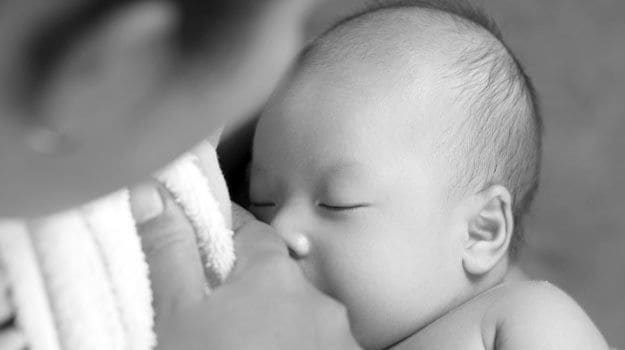Breast-feeding not only protects babies from premature deaths and serious diseases but also mothers from breast cancer and heart attacks, among others, suggests a study.According to the study published in the journal Maternal and Child Nutrition, breast-feeding helps mothers to reduce chances of getting diagnosed with breast cancer, per-menopausal ovarian cancer, diabetes, hypertension and heart attacks.For children breast-feeding reduces the risk of diseases like acute lymphoblastic leukemia, ear infections, Crohn's disease, ulcerative colitis, gastrointestinal infections, lower respiratory tract infections, obesity, necrotizing enterocolitis and sudden infant death syndrome (SIDS).
"Breast-feeding has long been framed as a child health issue, however it is clearly a women's health issue as well. Breast-feeding helps prevent cancer, diabetes and heart disease, yet many women have no idea breast-feeding has any of these benefits," said Eleanor Bimla Schwarz, Professor at University of California - Davis Health System in the US.For the study, the research team modeled two groups: One was an "optimal" group in which the majority of moms breastfed as recommended. That group was compared with a "sub optimal" group, in which young mothers breastfed less than the recommended guidelines.Using existing research and government data, they projected the rates and costs of diseases that breastfeeding is known to reduce, along with the rates and costs of early deaths from those diseases."Breast-feeding is far more beneficial in preventing disease and reducing costs than previously estimated," said Melissa Bartick, Assistant Professor at the Harvard Medical School.Currently, 22 per cent of employed mothers return to work within 10 days of childbirth. Paid leave keeps mothers and babies together, which is essential for breast-feeding. Enacting paid family leave will impact the lifelong health of women and children, suggested the study.The study authors said their findings underscore the importance of providing women with the support they need to breast-feed their babies, beginning at birth."The study results underscore the importance of policies that make it possible for women to breastfeed," Alison Stuebe, Associate Professor at the University of North Carolina, US.(This story has not been edited by NDTV staff and is auto-generated from a syndicated feed.)
"Breast-feeding has long been framed as a child health issue, however it is clearly a women's health issue as well. Breast-feeding helps prevent cancer, diabetes and heart disease, yet many women have no idea breast-feeding has any of these benefits," said Eleanor Bimla Schwarz, Professor at University of California - Davis Health System in the US.For the study, the research team modeled two groups: One was an "optimal" group in which the majority of moms breastfed as recommended. That group was compared with a "sub optimal" group, in which young mothers breastfed less than the recommended guidelines.Using existing research and government data, they projected the rates and costs of diseases that breastfeeding is known to reduce, along with the rates and costs of early deaths from those diseases."Breast-feeding is far more beneficial in preventing disease and reducing costs than previously estimated," said Melissa Bartick, Assistant Professor at the Harvard Medical School.Currently, 22 per cent of employed mothers return to work within 10 days of childbirth. Paid leave keeps mothers and babies together, which is essential for breast-feeding. Enacting paid family leave will impact the lifelong health of women and children, suggested the study.The study authors said their findings underscore the importance of providing women with the support they need to breast-feed their babies, beginning at birth."The study results underscore the importance of policies that make it possible for women to breastfeed," Alison Stuebe, Associate Professor at the University of North Carolina, US.(This story has not been edited by NDTV staff and is auto-generated from a syndicated feed.)
Advertisement



